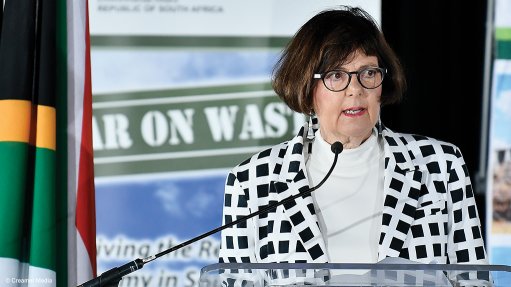
Environment, Forestry and Fisheries Minister Barbara Creecy
Photo by: Donna Slater
Leading food retailers in South Africa have asserted their commitment to initiatives that reduce food waste in their businesses, during the launch of the Food Loss and Waste Voluntary Agreement, on Tuesday.
The Agreement brings together the Consumer Goods Council of South Africa; the Department of Trade, Industry and Competition and the Department of Environment, Forestry and Fisheries and provides opportunities for public awareness campaigns to highlight to South Africans and the food industry the state of food waste and its impacts on the environment and human health.
The Food Loss and Waste Voluntary Agreement is in line with the Sustainable Development Goals adopted by United Nations member States in 2015 and which aims to halve global food loss and waste by 2030.
Environment, Forestry and Fisheries Minister Barbara Creecy said on Tuesday that awareness-raising and public education could see an increase in food being redistributed and surplus food being donated to registered NGOs.
“South Africa is already one of the 30 driest countries on earth with regards to climate change and environmental degradation threatens our water resources. This in turn impacts on agricultural production and long term food security. In the modern world we now all understand that natural resources are not infinite and it only makes sense that food waste be curbed,” she explained.
The agreement will help develop a Web-based food waste reporting system for the signatories for effective monitoring, for the mapping of South African food waste hotspots and the development of a knowledge hub, geared towards information and best-practice sharing.
“The journey leading up to today’s launch has been long and it required consistent government and private sector cooperation and collaboration. It has also required great minds to come together and map out a trajectory that the country will follow which will unlock and assist the establishment of new business opportunities related to food and plastic waste emanating from the food supply chain – leading to job creation and growth in the national GDP,” Creecy said.
New solutions that enable sustainable consumption and production patterns are required, she added.
Further, she pointed out that reducing food loss and waste would contribute to environmental sustainability by lowering production costs and increasing the efficiency of food systems.
“A better understanding of environmental and social impacts of products and services is needed, both of product life cycles and how these are affected by use within current lifestyles. Alternative methods of farming are already being used that are making agriculture more sustainable which also ensure resource efficiency,” she concluded.